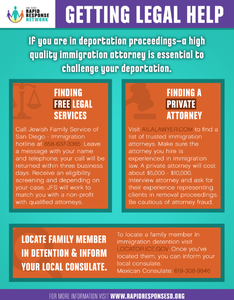As a response to the current Administration’s aggressive deportation tactics, American Civil Liberties Union (ACLU) of San Diego and Imperial Counties launched the San Diego Rapid Response Network (SDRRN)–an interconnected system of organizations and individuals working together to respond to dehumanizing immigration enforcement activities, including checkpoints, raids, and arrests in the County. Casa Cornelia is one of the various service providers of SDRRN, offering screenings and free legal services to people identified through and referred by the network. On April 24, I interviewed Elizabeth Camarena, Associate Director of Casa Cornelia, to ask for her thoughts in this time of crisis.
How does SDRRN run such complex operation?
Our partners have a deep understanding of the community needs, and rely on
one full-time staff member at ACLU and a large network of volunteers. Some
of them work on the hotline, others provide legal and non-legal services and
resources. We have committed volunteers that advocate for rights and fair
processes for our neighbors. The SDRRN community also has creative individuals
that develop flyers, software, and other resources to keep everyone interconnected.
What is different in today’s immigration policy?
It is important to understand that immigration law has not changed. However,
this federal administration is implementing different enforcement policies from
the previous administration. This translates to heightened internal enforcement,
higher number of detained persons throughout the deportation process, which
can last from six months to a year or two in San Diego. Other parts of the country
differ in processing times. Overall, heightened enforcement stresses the detention
system as well as the immigration court system. 
What do affected families go through in this legal process?
The legal process, in general, is complex. Family members are often in crisis, overwhelmed with the very real possibility of being separated from a family member, perhaps having them detained in a facility in another county or state. Navigating the process is not easy. First, there are language barriers, and even if you are fluent in English, the types of relief available to prevent a deportation are difficult to identify and understand. Additionally, required documentation is difficult to prepare, and communication with ICE requires time and persistence. Hence, access to quality legal assistance is critical.
Why is Casa Cornelia part of this network?
Casa Cornelia’s mission is to provide pro bono legal services to victims of human and civil rights violations in the Southern California indigent community. There is a rapidly growing need for free legal services in San Diego County and the state in general. More importantly, families in crisis may be targeted and fall victims to a growing number of unscrupulous attorneys that charge very high fees for services even if an individual has no real opportunity to access immigration relief. If someone is going through deportation proceedings and is in crisis, families will pay those who promise not only a release of their loved ones, but safety from deportation. At Casa Cornelia, we continue to streamline our services to be as effective as possible in our mission and respond to the needs of the community. We stand ready to provide legal representation and access to our justice system to those in greatest need through our quality pro bono services.
